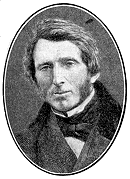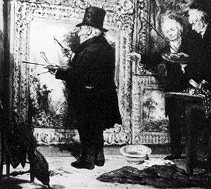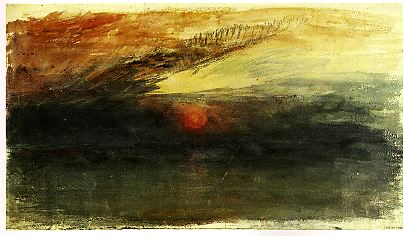 John Ruskin (1819-1900) |
Ruskin on TurnerThirst for largeness - grasp of terror |
|
WHAT WAS IT in William Turner's art that so immensely captured John Ruskin that he almost devoted his life to the advocacy of it? Maybe he saw some of his own transformed desires in the works of the great master of light, surf and rock. I deliberately avoid the modern term sublimation, since this mental state neither was modern nor sublime, but heavy as the stones of Venice he also chose to write about  Ruskin's life appears to us as a tragic one. Living too close to his Calvinist mother, he probably never really grew up mentally. After an unhappy love affair with Adèle Domecq at the age of 17, he turned to his studies at Oxford, and began collecting pictures by Turner three years later. After graduation in 1842, Ruskin planned a book in defense of Turner, whose work had been mocked by the critics. Ruskin's life appears to us as a tragic one. Living too close to his Calvinist mother, he probably never really grew up mentally. After an unhappy love affair with Adèle Domecq at the age of 17, he turned to his studies at Oxford, and began collecting pictures by Turner three years later. After graduation in 1842, Ruskin planned a book in defense of Turner, whose work had been mocked by the critics. |
| Turner on varnishing day, by S. W. Parrott |  |
 The result was "Modern Painters", published in five volumes 1843-60. During those years Turner himself had died, at the age of 76 in 1851. He left behind some 300 paintings and 19,000 drawings and watercolors, that Ruskin cataloged. The result was "Modern Painters", published in five volumes 1843-60. During those years Turner himself had died, at the age of 76 in 1851. He left behind some 300 paintings and 19,000 drawings and watercolors, that Ruskin cataloged. In 1848 Ruskin married Effie Gray, who later left him for one of the Pre-Raphaelites, John Everett Millais. Nevertheless, Ruskin wrote a book in defense of this artistic movement, "Pre-Raphaelitism" (1851). Apart from "Modern Painters", his most famous works are "The Seven Lamps of Architecture" (1849) and "The Stones of Venice" (three volumes 1851-53). Ruskin detested industrialism and also wrote several essays about social reform that were later collected in "Unto This Last" (1862). In 1848 Ruskin married Effie Gray, who later left him for one of the Pre-Raphaelites, John Everett Millais. Nevertheless, Ruskin wrote a book in defense of this artistic movement, "Pre-Raphaelitism" (1851). Apart from "Modern Painters", his most famous works are "The Seven Lamps of Architecture" (1849) and "The Stones of Venice" (three volumes 1851-53). Ruskin detested industrialism and also wrote several essays about social reform that were later collected in "Unto This Last" (1862). |

Turner's "The Sun Setting among Dark Clouds", watercolor, appr. 1826.
 Another youth with a severe mother fixation, who had wandered around the quays of Venice studying its pillars and façades, was Marcel Proust. He admired Ruskin's writings to the extent that he translated one of the social essays, "Sesame and Lilies" (from 1865), into French. Proust wrote that after having read Ruskin "the universe regained in my eyes an immeasurable value." Another youth with a severe mother fixation, who had wandered around the quays of Venice studying its pillars and façades, was Marcel Proust. He admired Ruskin's writings to the extent that he translated one of the social essays, "Sesame and Lilies" (from 1865), into French. Proust wrote that after having read Ruskin "the universe regained in my eyes an immeasurable value." Although Proust had one of his characters in "Remembrances of Things Past", Bloch, claim that Ruskin was but a "boring old man", it is understandable that Proust was fascinated by Ruskin's extreme perception Although Proust had one of his characters in "Remembrances of Things Past", Bloch, claim that Ruskin was but a "boring old man", it is understandable that Proust was fascinated by Ruskin's extreme perception /KET Note: "Thirst for largeness - grasp of terror" is taken from the last paragraph of Ruskin's notes on "The Goddess of Discord in the Gardens of the Hesperides".
|
